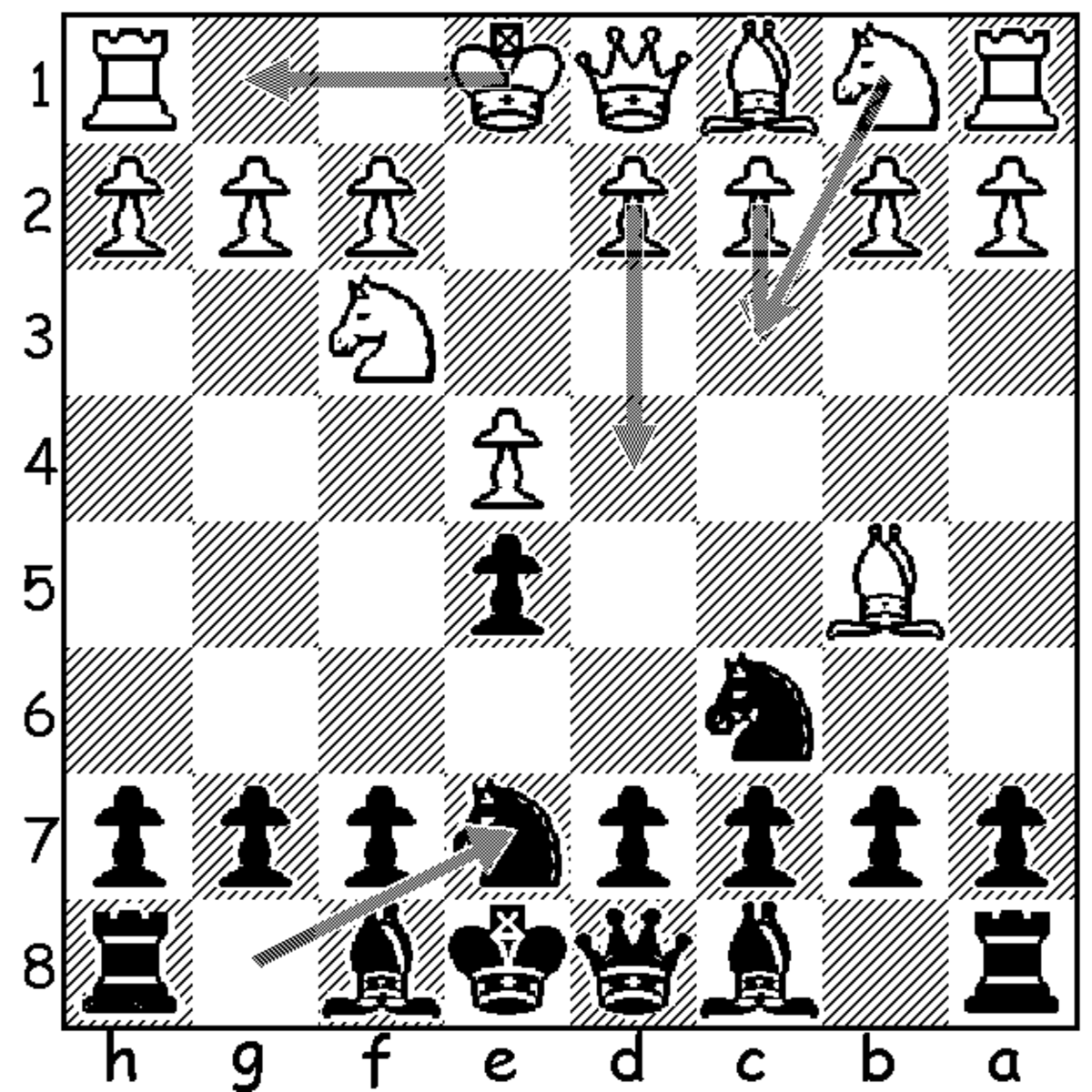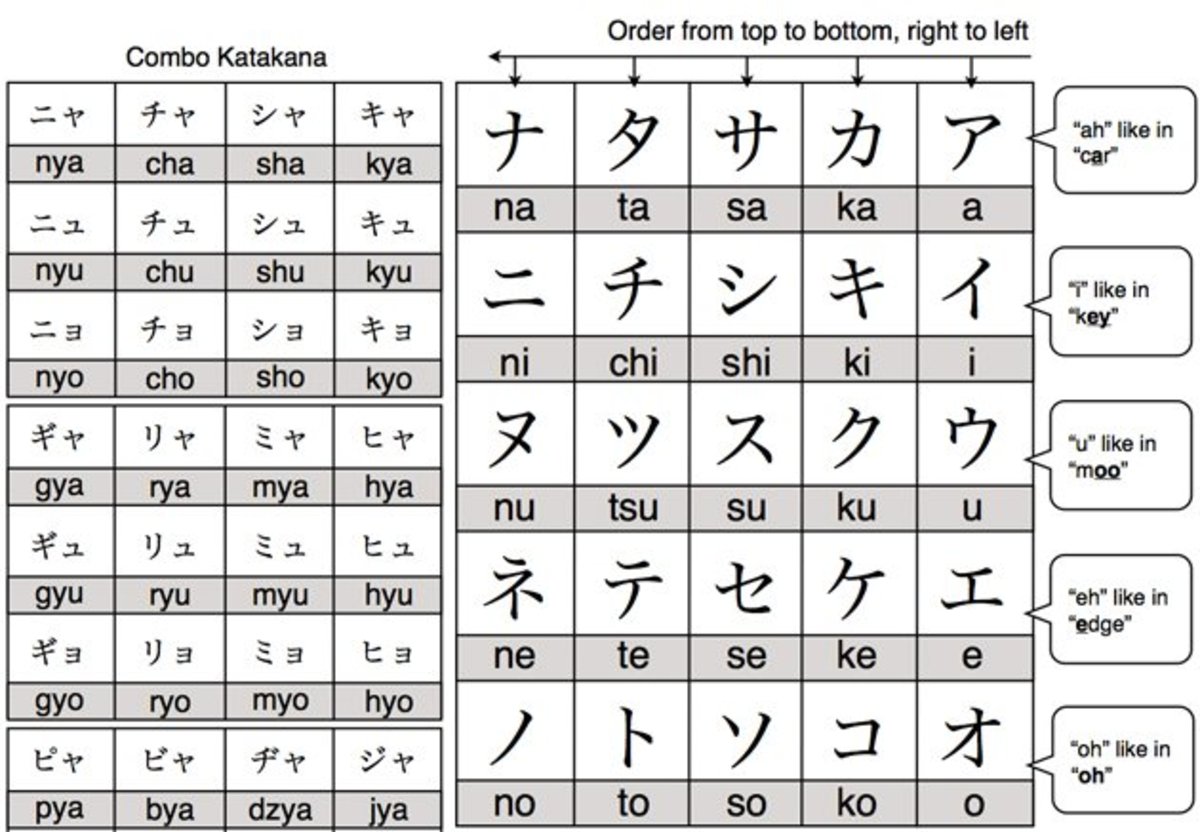A Guide to Japanese Dictionaries
Can You Tell Which One is Sugar?
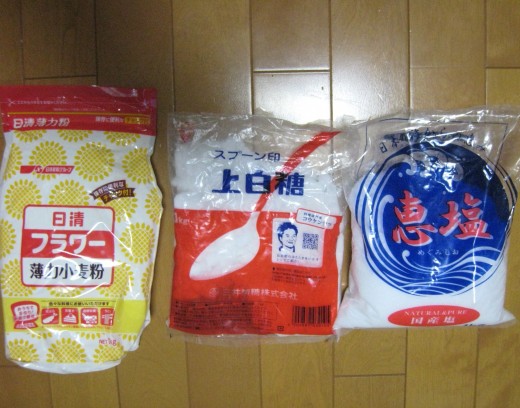
A Dictionary: Your Indispensable Ally Against the Evil Forces of Kanji and Japanese
Learning Japanese has its good points and its bad points. Just some examples, being able to communicate with Japanese speakers is a good point, and memorizing thousands of kanji is a bad point. I think no matter what level of Japanese you're at, dealing with kanji is probably the most technically difficult part of learning the language. For example, you can be cruising through a neat biology article online in Japanese, and all of the sudden this gnarly character that looks like this 鼠 acts as a roadblock to literacy. You think, "Well kanji is basically just a picture, so let's try to decipher it". You notice the thing on top looks like a robot mouth with vents, and the bottom looks like a beard. Connect the dots and you have big bushy bearded robot...right? Of course not! Being able to tell what a kanji is just by looking at the picture it represents probably only applies to an anorexic 1% of the kanji you learn, and here, finally, is where the dictionary steps in to save you from being another victim of illiteracy.
A List of Available Dictionaries and Their Comparative Advantages
There are a few options that I've come across in my search for Japanese dictionaries, and they boil down to the following:
1. Buying a good ol' fashioned 電子辞書 (denshi jisho), which translates to electronic dictionary. These are made by any number of companies and if you go into an electronic store in Japan, you'll be mobbed by the selection you see in front of you.
2. Using an Ipod Touch or Iphon and downloading the free app called Kotoba or the $10 app called Japanese. This allows you to use the Apple equipment of your choosing to draw kanji with your finger and then look it up.
3. Buying a Nintendo DS and then buying a kanji dictionary for it on top of that. Obvious benefit of this option is that for a smaller price than the above two options, you get to have a dictionary and a neat little gaming machine.
4. Going completely free and using only online resources. This one is fine if you're chained down to the floor next to your computer, but for those of us who like to study in coffee imbibing institutions without wifi this can be a problem. You might say, "Well it's free so you can't complain", but complaining about free things is a hobby that many people take pleasure in.
Now on to a short break down of each option, along with the winner in respect to price, usage, convenience, and quality.
A standard electronic dictionary
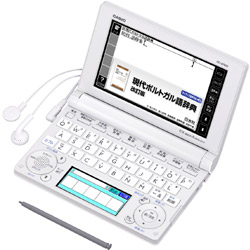
My crappy electronic dictionary sans touch pad
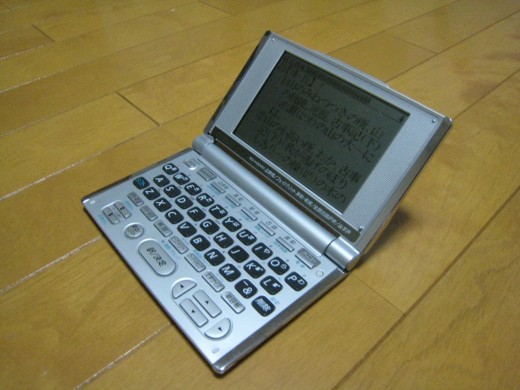
Dictionary Option #1 The Denshi Jisho
These bloody things are really expensive if you want to get a good quality one. You can get one without a stylus and drawing part for about $150, but that would literally be a waste of everyone's time, including the cashier who rings you out for such a worthless piece of equipment. A dictionary with touchpad capability will run you an easy $250 or so, which is a little pricey for something you'll be using just to learn Japanese. If you're fluent in Japanese though, there's some justification for this price because they come pretty well equipped with things like encyclopedias, pictures, and the most in depth definitions and information out of the rest of the options.
Verdict: Way too pricey for just serving as a dictionary. Unless you're using it beyond looking up the occasional word and kanji, then there are better options.
The dictionary entry page
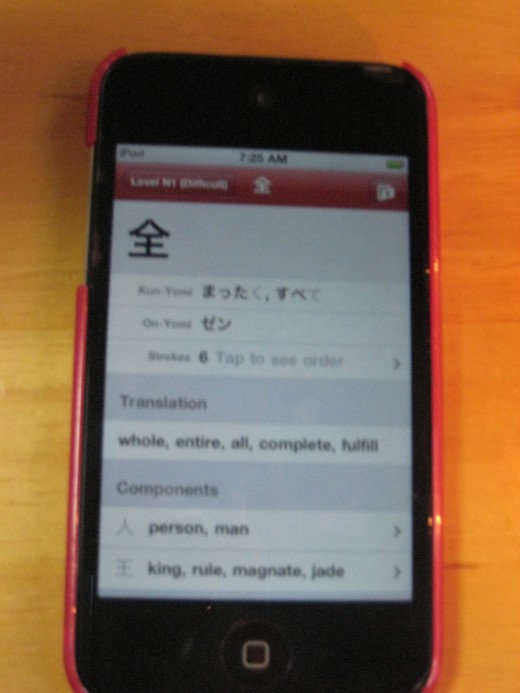
Dictionary Option #2 The Apple Path
I complained above about the denshi jisho being a pricey choice, which will probably make you think I'm a hypocrite for not criticizing the Ipod for the same reason. Depending on the amount of memory you get, an Ipod Touch will run just about the same as a low-end Denshi Jisho, or maybe slightly below. However, you get a lot more for your buck, as you can listen to extremely tasteful music or fool around on apps or the internetz where there's wifi. Multi-functionality is always appealing in my book. Regarding the dictionary capabilities on the Ipod Touch, I HIGHLY recommend this app http://itunes.apple.com/us/app/japanese/id290664053?mt=8. It costs $10 as opposed to the free app (called kotoba), but it gives you time saving live search options (meaning as you search for words, it'll continuosly update the list to give you more options). Also, it gives you flashcards for all of the JLPTs (Japanese laguage proficiency test), which is really handy for studying. Your best bet is to just get both though, because as you play around with them you'll see the advantages to both.
Compared to the denshi jisho, the dictionary portion isn't nearly as in depth as the electronic dictionary above, but it gets the job done. Also, using your finger to draw kanji can be a pain sometimes, and you end up using a fingernail which can injure your screen for the sake of precision.
Verdict: Still kind of pricey, but in regards to overall functionality very good and worth the money.
A photo of drawing the kanji on the Japanese app
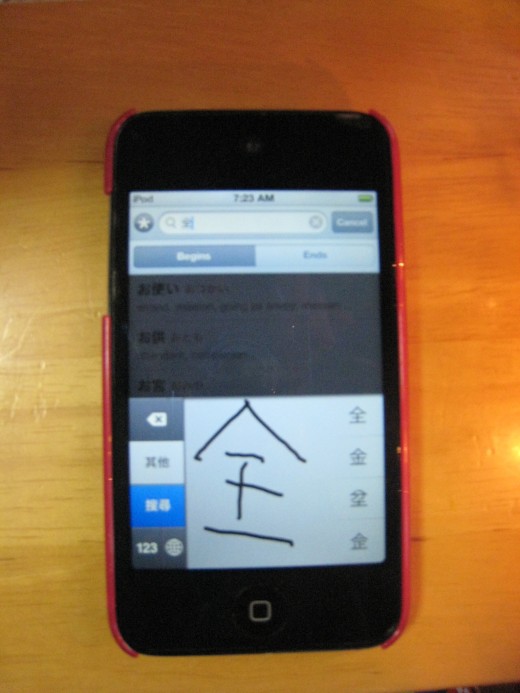
The upper screen that shows the entry
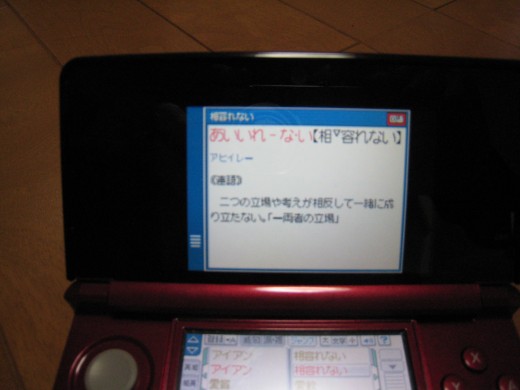
The bottom screen where you draw the kanji
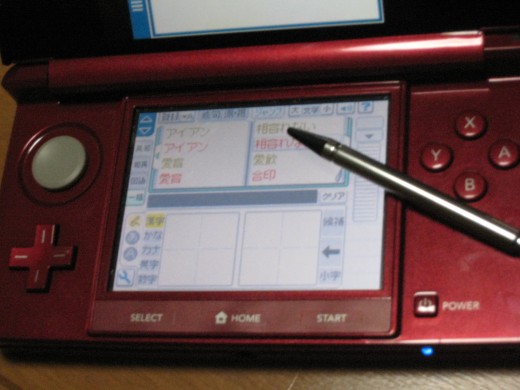
Dictionary Option #3 The Nintendo DS
With the recent drop in price for the Nintendo 3DS, I purchased one of these beauties along with a dictionary called "Kanji Sono Mama", which is fairly well known. Unfortunately though, the DS came with a highly discounted game, and I ended up spending the first few hours with the DS playing instead of studying. However, here's the run down on the dictionary:
All in all, you'll be fairly satisfied with the dictionary for the DS. I bought mine in Japan off of Amazon, and it only cost me about $25, which added to the 3DS price of $150 or so, isn't that bad of a deal for an electronic dictionary. On top of that, you get a sweet gaming console that can also serve other purposes (like counting how many steps you've walked that day woo!). The downside to the dictionary is that it doesn't have nearly as many entries as the Ipod Touch or the denshi jisho, but it still gets the job done. Also, if you don't know stroke order for kanji it can sometimes take a few tries to get the dictionary to pick up on the kanji you're trying to draw. On top of that, there's no "jump" function in the Japanese to Japanese dictionary, meaning that you can't just scroll through the entry and click on a word and have the dictionary bring you to the meaning. You'll instead have to individually search each thing. This was a major disappointment for me, and something that I wish someone had told me about.
Verdict: Price wise a really good deal, considering you're getting a gaming system on top of a dictionary for less than the other two options that cost money. However, there are some setbacks that can be annoying, but easily dealt with and overlooked.
Dictionary Option #4 The Free Bird
Being half American, I'll do almost anything for something that's free. There was always that really weird kid's house that you didn't want to go to, but then someone would say, "Well, there's free pizza", and something inside of you just couldn't resist. In much the same way, you have to look at the trade offs with going with the completely free route.
The first major road bump probably comes in the form of not being able to easily draw the kanji that you're looking for. If you're at home and have a mouse, it's pretty easy, but if you're on a laptop and in the library, then using the touchpad can be torture when you're trying to draw the more complex kanji. In regards to actually looking up words though, my favorite and indispensable site is http://www.csse.monash.edu.au/~jwb/cgi-bin/wwwjdic.cgi?1C, which can also be reached by typing in "Jim breen's" into google. There, you can go to the text glossing section and copy and paste entire paragraphs. Also, there's a neat little add on called Rikai Kun (found here https://chrome.google.com/webstore/detail/jipdnfibhldikgcjhfnomkfpcebammhp) which translates things you highlight with your mouse. That being said, the power that you have for looking up what words mean for free is pretty amazing.
The Verdict: The downside is the lack of portability and also fumbling around on different webtabs and trying to draw kanji without a mouse. If you're fine with that though, then there's no reason why you can't stick to the free path. Also, if you lug around a laptop wherever you go to study Japanese, you might just look more important than you actually are.
The Grand Verdict-- Which Option Rises Inexorably Above the Rest?
Having personally experienced all four options, I have to say that the Ipod Touch is your best bet for a dictionary. It looks up words and kanji wonderfully and at the perfect level of description for those not 100% fluent in Japanese, and it has other cool functions to boot. The Nintendo 3DS comes in 2nd place, but having to deal with cartridges and looking like a middle school boy whenever you use it makes it not the best option for learning Japanese. The electronic dictionaries go WAY overboard, and essentially give you more power than you can responsibly wield. Going with option #4, is all fine and good, but let's try to live less sedentary lives, yes?
Hope this guide was helpful, and feel free to add any dictionaries you've toyed around with in the comments section!

![Kanji Sonomama DS Rakubiki Jiten - (NDS) Nintendo DS [Pre-Owned] (Japanese Import)](https://m.media-amazon.com/images/I/51YS3AdTT+L._SL160_.jpg)


